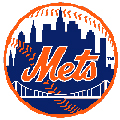New York suffered a heavy blow in 1958. The Giants and the Dodgers, the city's two other teams (therefore the only ones who could make a Subway World Series happen), left for California. For a considerable part of the city, it was a catastrophe -- a mishap that left those who didn't like the Yankees no less than orphans. In Brooklyn, were support for the Dodgers is the neighborhood's lifestyle, it was perceived as a disaster.
Fortunately, in life there are such things as second chances.

A lawyer called William Shea managed to obtain a license to create a third league and to acquire an area for a new team to play -- a team that would rival the Yankees.
The Continental league, as it was baptized, failed in almost every level. It was dissolved after a few months, leaving nothing but huge debts and sarcastic laughs coming from The Bronx. But it didn't matter to Shea. He still retained the license to form a team of enemies to the Yankees.
Shea struggled to come up with a name. He had a few ideas, none of the which were good: the Burros (both as a reference to the New York boroughs and a nod to New York's increasing latino population, who'd interpret that word as a hard-working donkey in Spanish), and the Continentals.
Fortunately, in the end he remembered that the first baseball team in the city had been called the Metropolitans and settled for an abbreviation of it -- thus, the New York Mets were born. (The names in American sports teams always have strikingly arcane origins -- the basketball team the Knicks owes its denomination to the "knickerbokers", a type of pants that were famous in the 1930s.)
The team's emblem was no exercise in originality, either, but it was simple enough to work. Its colors were taken from the Dodger's blue and the Giants' orange, which happened to be the colors in New York's flag (an echo of the Dutch flag in the 17th century). The logo was composed of a baseball ball with a bridge inside -- a symbol of the city's openness and its spirit of rapprochement between the isles. Let's not forget that New York is formed of islands and only the Yankees' Bronx belongs to the continent.
In 1964, the Mets' official stadium (called the Shea Stadium in honor of the teams' founder) was inaugurated in Queens. While the facilities were impressive, some critics complained of the field's location, "considerably close" to the LaGuardia airport. "Considerably close" is good a euphemism. Fans with the higher seats could practically grab on to the passing planes. Their noise could also be considered noteworthy, if noise is ever noteworthy in a stadium.

The Mets' first official game took place in St. Louis on April 11, 1962. They lost to the Cardinals 4 to 11..
The next game was played at home, in the provisional emplacement of the Polo Grounds (Upper Manhattan). It didn't have a happier ending: the Pirates beat the Mets 4 to 3. This concatenation of defeats, it was generally assumed, would one day lead to an epoch of wonderful victories.
Game after game, the Mets acquired a wonderful approach to defeat. It was best summarized in the philosophical lament of one of its pitchers, Roger Craig (who lost up to 20 games in a season in the 90s): "I don't mind the losing," he said. "It's not winning that hurts."
Such a healthy, stoic philosophy came in handy for the 2000 Subway Series. To say expectations were high is perhaps an understatement. The Mets had Mike Piazza, a batter who was rumored to win Player of the Year. They had made a fantastic season. The Yankees, well, were the Yankees. A close fight was guaranteed.
But it was never delivered. Piazza had a problem in his elbow and, posed with the challenge, the team decided to stick to what they knew better -- defeat. They lost the first game, and then the second game. The Yankees won the World Series again. Which would happened again in 2002, while the Mets made the worst season in their history.
In 2009, they moved to a new stadium, called the Citi Field. It was next to their old one. Their luck changed just as little. Fortunately for their passionate, devoted fan base, in America teams don't fall to a lesser category after a series of defeats. They simply end up in the bottom place. For the time being.